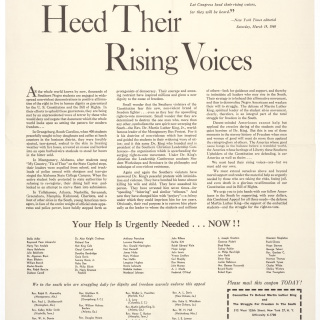New York Times v. Sullivan 1960
Had this case gone the other way, the civil rights movement might have been a murmur rather than a roar. Instead, it ushered in a new era of freedom of the press. In 1960, a Montgomery, Alabama, city commissioner sued the New York Times for libel when he discovered several factual errors in an advertisement supporting the emerging civil rights movement. Libel (a malicious, false statement) is not considered protected speech. A lower court ordered the Times to pay $500,000 in damages. But the Supreme Court ruled for the paper, asserting that factual errors alone did not place speech outside of First Amendment protection. The plaintiff had to prove the speech was motivated by “actual malice” or intent to harm.
